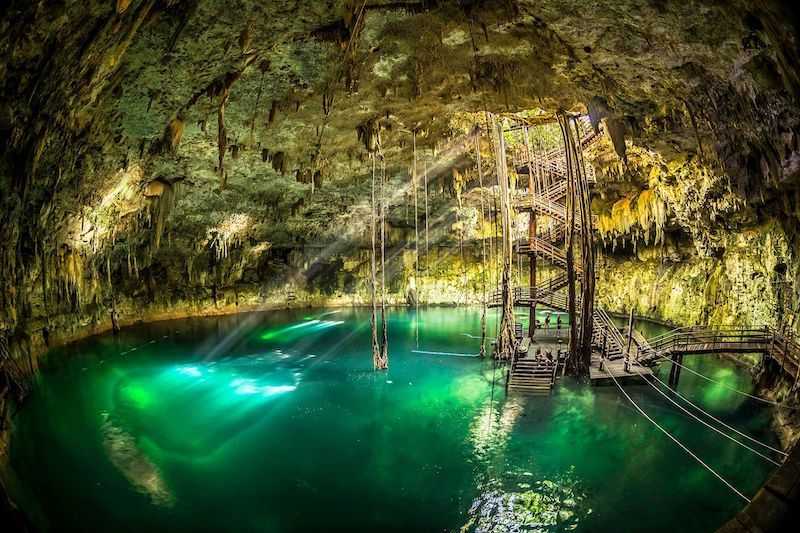Yucatan will certify tourist cenotes under criteria and objectives of International Sustainable Development

• In an inter-institutional coordination between Sefotur and SDS, 113 cenotes located in the six tourist regions of the State will be accredited.
• It seeks to protect and preserve the karstic ecosystems, its bio-cultural and historical heritage, as well as to promote and guarantee safe, socially and environmentally responsible tourism.
Mérida, Yucatán, November 19, 2020.- Aligned with the State Development Plan of the Government of Mauricio Vila Dosal, the Secretariats of Tourism Development (Sefotur) and Sustainable Development (SDS) established an inter-institutional alliance and coordination to implement and promote the Yucatan Tourist Cenotes Sustainability Certification Program.
It is the first time in the history of the state that this control and accreditation of cenotes will be carried out, through a series of field diagnoses to analyze the infrastructure, training and promotion actions, as well as the specific study of its social and environmental impact. environment and, with this information, develop a series of actions with the regulations and tourist value, which gives as a final result this distinction.
Said Certification will be carried out through a specific evaluation framework that will allow regulating, optimizing and positioning the sector in accordance with the sustainability criteria of the World Council for Sustainable Tourism and the Sustainable Development Goals of the United Nations (UN).
This will be replicated in the 113 tourist cenotes identified in the six regions of Yucatan, divided into tourist activities such as: spring, diving, cenote, cave and cave diving. In addition, these measures seek to protect and preserve the karst ecosystems, their biocultural and historical heritage.
Also, another goal is to promote and guarantee safe, socially and environmentally responsible tourism, together with economic development for the resident population, with strict respect for the environment, and strengthen the value chain for the benefit of the populations around the Water body.
On the other hand, each cenote with a tourist offer from the state in terms of sustainability will be identified, registered and evaluated, to provide support, facilitate and encourage service providers to be part of the regulatory processes for the execution of good practices, aimed to obtain this merit.
This Certification will bring great benefits, since it will guarantee compliance with the social, cultural, ecological and economic standards established in the applicable regulations of the Government of Yucatan and the National Institute of Anthropology and History (INAH).
At the same time, it establishes standards for ecotourism and sustainable tourism companies, motivates private initiative and other providers to improve their environmental, social and economic performance, as well as transmitting to the passer-by a feeling of confidence and security, in addition to strengthening the promotion of the place.
This certificate will be obtained by the owner of the cenote, including municipalities, groups, the Government, and any individual that takes advantage of or generates income from these bodies of water, but not without first demonstrating that their environment and the personnel that administer it comply with the sustainability criteria specified in the evaluation.
The points to consider integrate economic, environmental and socio-cultural axes, among which are local viability and prosperity, social equity and visitor satisfaction, community well-being, compliance with environmental and heritage regulations, cultural richness , the inclusion of vulnerable and disabled people, the effectiveness of resources, among others.
Although they have a high potential to be managed for tourism and leave economic benefits, cenotes are delicate and highly vulnerable ecosystems, so human activities involve various risk factors if they are not managed properly, which is why this distinction arises. .
The process consists of three visits: in the first the diagnosis will be carried out, samples will be analyzed and observations will be made on the necessary adjustments; in the second, compliance with the previous recommendations will be verified and a final report will be drawn up so that, in a third, the Certificate is delivered.
During the first phase, it will be considered that the infrastructure of the cenotes has a reception and attention area, toilet service, signage and use of materials from the region; In addition, you must have certified guides under the Official Mexican Standard NOM-09/08, badges, general information and a tourism promotion program and tourism program of the local community.
The Certification is free during the evaluation process, while the necessary adjustments, as well as being within the regulations for the operation, will be borne by the owners.
Among other benefits, an information card will be made for each cenote and promotion of these in media and social networks; In addition, they will be provided with first aid and hospitality training, while complying with environmental regulations, ensuring their long-term source of employment, generating commitment with the population and attracting more passers-by, with their respective economic benefit.
This Friday, November 20, the tours of the staff of both dependencies will begin to the 71 cenotes located in the Cenotes and Haciendas region, 27 in the Mayan World Capital, seven more in Puerto Maya, four in the Yucatan Riviera, three others in the Ruta Puuc and Mayan Villages, and finally, one more in Mérida, Capi
Strategy